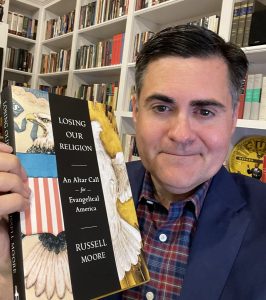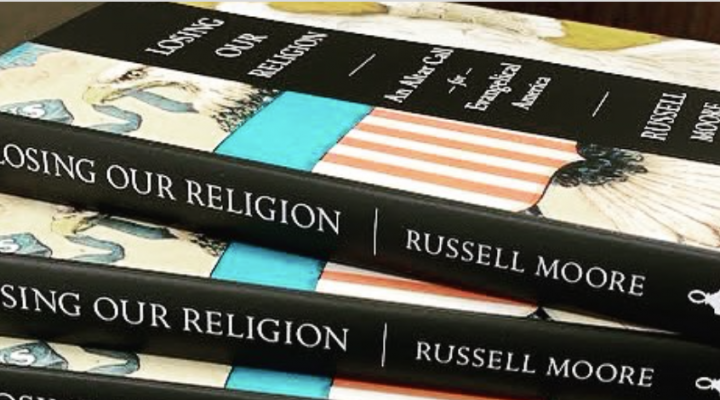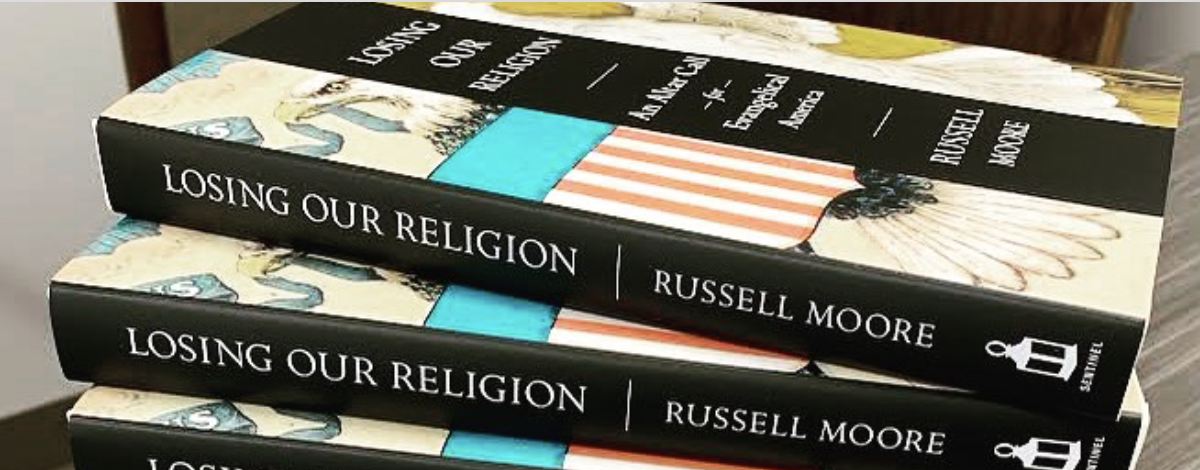Russel Moore’s Losing Our Religion is at least six books in one.
It’s part jeremiad, lamenting the crisis in American Christianity and describing the “collective trauma” evangelicals — including battling Southern Baptists — have inflicted on themselves and the nation in recent years.

Russell Moore
It’s part funeral oration, grieving and mourning evangelicals’ self-inflicted loss of “our credibility, our authority, our identity, our integrity our stability and, in many cases, our sanity.”
It’s part war diary, as Moore describes the lingering wounds — including stress-induced tinnitus and nightmares — resulting from the heresy trials and psychological warfare he endured after committing two unpardonable sins during his time as head of the Southern Baptist Convention’s Ethics and Religious Liberty Commission: Criticizing Trumpism and supporting victims of sexual abuse, not the SBC pastors who victimized them or the SBC systems that spurned calls for justice.
SBC leaders wielded “Machiavelli-like cruelty and Caligula-like vulgarity” to maintain power, but their campaigns have born bitter fruit, he writes.
Now an “accidental exile” from the denomination he served for decades as a pastor and seminary professor, Moore serves as minister in residence at the nondenominational Immanuel Nashville Church and as editor-in-chief of Christianity Today.
“I can see how we pioneered many of the same patterns that later showed up, with full force, in the rest of American life,” he writes of SBC leaders, including himself. (He acknowledges his own “arrogant” rhetorical assaults on perceived enemies, including author Beth Moore, now a friend.)
It’s part damning critique of evangelicals’ politicization of faith. Each election is the most important election in our lifetimes, we’re told, and the fate of Western civilization rests on each vote. To win, our tribe exploits the same dirty tricks as other high-power blocs and interest groups.
In Moore’s evangelical America, “it’s always Election Day and never Easter.”
In C.S. Lewis’ Narnia, it’s “always winter, but never Christmas.” In Moore’s evangelical America, “it’s always Election Day and never Easter.”
It’s part “testimony of what one homeless wayfarer has learned about surviving and keeping faith at a time when “the evangel and evangelicalism seem to be saying two different things.” This testimony joins a growing shelf of such critiques—including Mark Galli’s When Did We Start Forgetting God? and Constantine Campbell’s Jesus v. Evangelicals.
It’s 100% heartfelt altar call that asks Christians to forsake their shiny, false gods and return to their first love. Its musical soundtrack could be any number of classic revival hymns including, “Come home, come home; you who are weary come home.”
Grieving to the choir
Moore admits preaching to the choir but insists the choir needs it. In a July 12 interview, he explained that the book, the most difficult of the eight he’s written, flowed from the daily conversations he has with fellow accidental exiles.
“People are grappling with something we can’t quite see,” he said. “Something is struggling to be born, or born again.”
“Something is struggling to be born, or born again.”
While Losing Our Religion can be grim, it may comfort readers who “look around at the rest of the Christian culture and wonder if you’re the crazy one,” he said.
Moore has hope, but only in Christ and his Spirit-led body, not in the “populist and entrepreneurial energies that led American evangelical Christianity to grow into a world-influencing movement.”
Naming what’s lost
The core of the book is five lengthy chapters that alternate between the prophetic and the pastoral, showing what evangelicals have frittered away and offering suggestions for turning things around.
Lost credibility. We don’t seem to really believe Christ’s gospel message — particularly all that “woke” stuff about turning the other cheek and loving our neighbors or the church’s moral teaching, he says.
Believers take bold stands in defense of movements, causes or institutions but often lack character and have “deadened the sort of conscience needed to hear the call to repent.”
Fears of growing secularism lead some to “act in ways that tie the witness of the church to forms of power that actually fuel secularization.”
Lost authority. We’ve forsaken objective truth for the truthiness of our tribe, embracing divisive conspiracy theories and falsehoods as means to ends, and saying things we know aren’t true so we don’t offend tribal gatekeepers, he charges.
We willingly comply with authoritarian and totalitarian strong men whose main interest in religion is co-opting it.
We swear allegiance to crazy ideas — remember that secret pedophile ring in a D.C. pizza parlor? or that stolen election? — until they’re proved false, then we replace them with newer, crazier ideas. We’re characters in Orwell’s Animal Farm, devotedly chanting “Four legs good, two legs bad” until we chant the opposite.
Lost identity. We change the world through culture war, not evangelism or charity, unaware that our battle against secularism is another form of it, he continues.
We don’t find our identity in Christ, but in Christian nationalism, “a kind of Great Commission-in-reverse, in which the nations seek to make disciples of themselves, using the authority of Jesus to baptize their national identity.”
We’ve bargained away “the blood of Christ for blood-and-soil.” It’s a bad deal.
Lost integrity. We embraced a promiscuous, profane, thrice-married casino magnate Republican, but condemned a sex-with-intern Democrat, showing the world we believe character matters only when advantageous, Moore says. Donald Trump personified what we’ve long felt deep down: “lack of Christian character is actually a benefit.”
“We’ve embraced a moral relativism that would make a postmodernist deconstructionist slink out of his faculty lounge in shame.”
We’re daily proving what many of our fellow Americans have long suspected: We’re hypocrites interested not in morality but in political power and cultural dominance. “We’ve embraced a moral relativism that would make a postmodernist deconstructionist slink out of his faculty lounge in shame.”
Lost stability. We ask God to send revival but would rather God help us “take America back” to some nostalgic golden era that few women, people of color or people under age 70 want to revisit, he says. For us, revival isn’t altar calls inviting repentant sinners to give their hearts to Jesus. It’s voter mobilization.
Moore says he talks to more pastors who want to become bi- or even tri-vocational, not because they lust after wealth, but because they are anxious about a career in which they’re always “one church uprising away from being uprooted.”
Death comes before rebirth
Moore isn’t sure where the evangelical movement is headed. Is it imploding? Is God tearing it down? Can it survive?
Like a good revivalist preacher, he makes clear that only Spirit-born revival — not any nifty seven-part makeover plan — can save evangelicalism from the deep hole it has dug itself into.
Is the movement even savable? Who knows. But Christ and his body live on.
Asked in the interview about the SBC’s recent annual meeting, Moore paused before saying, “I really love and care about these people and I grieve when I see things going awry. … It’s a tragic time.”


